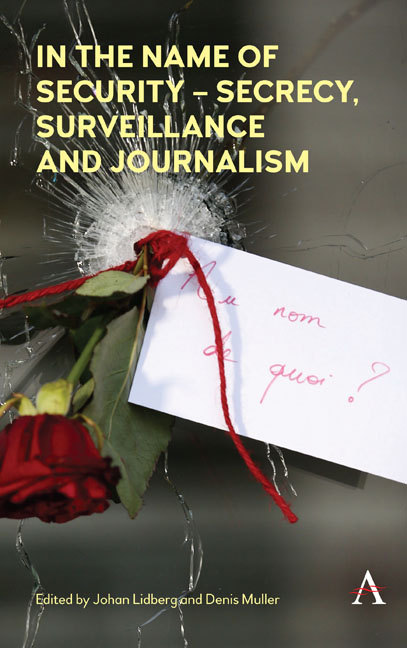Book contents
- Frontmatter
- Contents
- List of Tables
- Introduction
- Chapter 1 The Public Privacy Conundrum – Anonymity and the Law in an Era of Mass Surveillance
- Chapter 2 Undesirable Types – The Surveillance of Journalists
- Chapter 3 Surveillance and National Security ‘Hyper- Legislation’ – Calibrating Restraints on Rights with a Freedom of Expression Threshold
- Chapter 4 The Ethics of Reporting National Security Matters
- Chapter 5 When One Person's Noble Whistleblower Becomes Another's Poisonous Leaker
- Chapter 6 Who Watches the Watchmen? Access to Information, Accountability and Government Secrecy
- Chapter 7 Eyes and Ears in the Sky – Drones and Mass Surveillance
- Chapter 8 Looking over My Shoulder – Public Perceptions of Surveillance
- Chapter 9 Journalism and National Security in Three BISA Countries – Brazil, India and South Africa
- Chapter 10 Journalism and National Security in the European Union
- Chapter 11 The Security Reporter Today – Journalists and Journalism in an Age of Surveillance
- Conclusion: Journalism and the State of Exception
- Contributors
- Index
Chapter 10 - Journalism and National Security in the European Union
Published online by Cambridge University Press: 21 June 2018
- Frontmatter
- Contents
- List of Tables
- Introduction
- Chapter 1 The Public Privacy Conundrum – Anonymity and the Law in an Era of Mass Surveillance
- Chapter 2 Undesirable Types – The Surveillance of Journalists
- Chapter 3 Surveillance and National Security ‘Hyper- Legislation’ – Calibrating Restraints on Rights with a Freedom of Expression Threshold
- Chapter 4 The Ethics of Reporting National Security Matters
- Chapter 5 When One Person's Noble Whistleblower Becomes Another's Poisonous Leaker
- Chapter 6 Who Watches the Watchmen? Access to Information, Accountability and Government Secrecy
- Chapter 7 Eyes and Ears in the Sky – Drones and Mass Surveillance
- Chapter 8 Looking over My Shoulder – Public Perceptions of Surveillance
- Chapter 9 Journalism and National Security in Three BISA Countries – Brazil, India and South Africa
- Chapter 10 Journalism and National Security in the European Union
- Chapter 11 The Security Reporter Today – Journalists and Journalism in an Age of Surveillance
- Conclusion: Journalism and the State of Exception
- Contributors
- Index
Summary
Introduction
This chapter continues the outlook beyond the Five Eyes countries that started in Chapter 9. It provides further points of reference regarding the balance between security and openness, and puts those in relation to the Five Eyes group.
Europe carries a dark legacy when it comes to the balance between national security, intelligence and the people's right to know what is being done in their name. The aftermath of the ‘war to end wars’ (Wells 1914) did not go as planned – at all. Instead the heavy war retribution imposed on the losers of World War I (WWI) set the continent on the path to the 1930s, which saw the rise of a number of European totalitarian governments that eventually led to World War II (Gateva 2015).
As discussed in some detail in Chapter 6, during the international soulsearching that followed in the United Nations after the end of World War II, it was concluded that one of the reasons for the war was too much secrecy within and between countries (Lamble 2002). Some form of inter- country integration was seen by European political leaders as one way of breaking down these barriers. As early as 1946, Winston Churchill gave a speech at the University of Zurich in which he set out a vision for what he called ‘a kind of United States of Europe’. This ideal was the foundation of the European Union (EU) (Gateva 2015).
It started as three trade communities, the European Communities (EC), formed during the 1950s. Already at this early stage the founders of the EC articulated the ideal that close economic bonds, manifested by trade, could help secure long- lasting peace in Europe. So, just as the United Nations was a product of World War II, it could be argued that so was the EC, and eventually the EU (Gateva 2015).
Eventually as the EC evolved, the European cooperation deepened and led to the four freedoms on which the EU project rests: freedom of movement of goods, services, persons (including labour) and capital. The four freedoms are enshrined in the 2009 Treaty of Lisbon on which the European Union rests (ibid).
There has been much discussion about whether the EU is the start of a federated Europe.
- Type
- Chapter
- Information
- In the Name of Security - Secrecy, Surveillance and Journalism , pp. 195 - 208Publisher: Anthem PressPrint publication year: 2018

